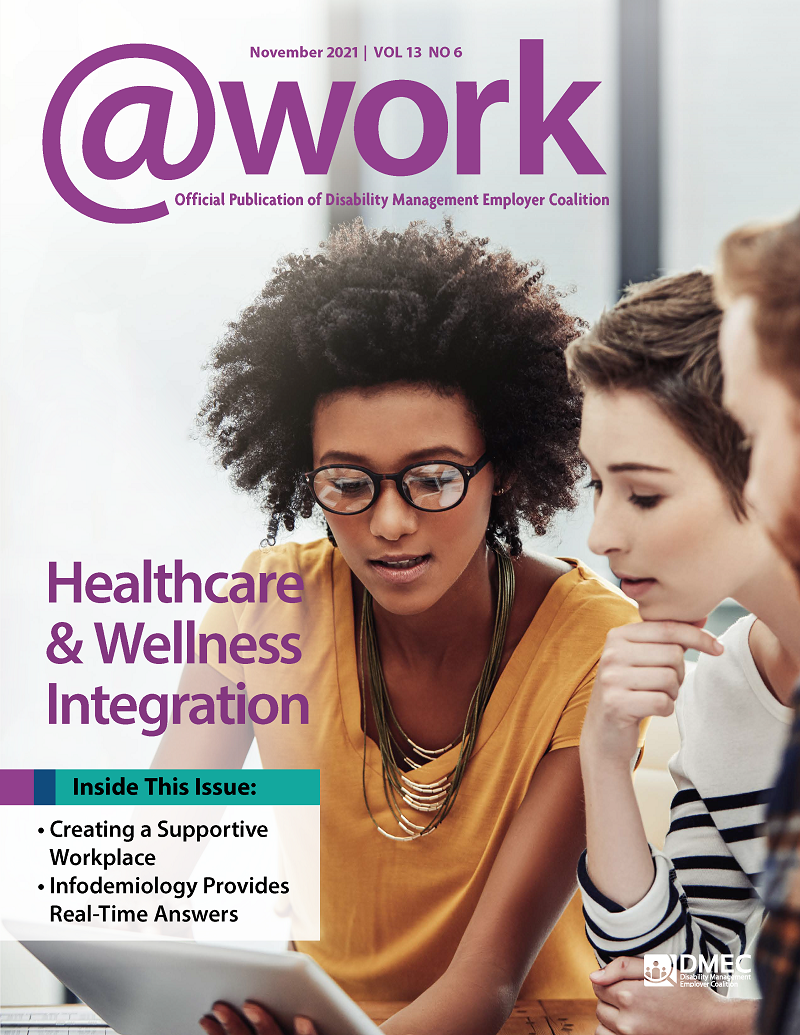
November 2021
Healthcare & Wellness Integration
Ensuring employee health and wellness is a key priority for employers as the pandemic continues to change expectations and shift how many businesses operate. This issue of @Work magazine provides perspectives on creating supportive workplaces and benefit plans, using healthcare data to manage illness claims, addressing mental health as part of a holistic health and wellness approach, and more.
Features
Getting Ahead of Engagement: A New Approach to Creating a Supportive Workplace
It’s critical to consider how managers interact with employees early and often throughout the absence process, and more recently, to address challenges posed by COVID-19 and other infectious diseases. It requires a new approach to plans, policies, and their interconnectedness to address confusion among employees about their benefits. Read more.

Infodemiology Can Help Provide Real-Time Answers for Employers
Big data, such as search queries and website usage, can help refine information delivered to healthcare professionals and case managers so they can provide high-quality treatment and manage injury and illness claims during these challenging times. Read more.

Spotlight Articles
Program Showcase: Behavioral Health
Employers play a major role in American healthcare by providing health insurance and pharmacy benefits for almost half the population. And while 79% of companies offered employee assistance programs as of 2019, almost half of workers say they don’t get the emotional support they need from employers. What more can companies do? Read more.

Program Showcase: Workers’ Compensation Programs
While we can deal directly with mental health matters in occupational disability now, thanks to regulation and coding changes, we must acknowledge and address the outdated perceptions and attitudes that continue to thwart progress in workers' compensation case management. Read more.

Compliance Showcase: COVID-19 Evolution
Many aspects of the COVID-19 pandemic have made it challenging for employers to protect the health and wellness of their teams, including the evolution of scientific understanding, which has prompted different recommendations and requirements for worker safety. Read more.

Columns
Absence Matters: Boost Productivity with Mindfulness
Stress is inescapable. It affects us at work and home and can lead to anxiety and depression, costing employers up to $1 trillion in lost productivity. Absence and disability management professionals know that reducing stress can reduce workplace injuries and burnout. What we might not remember is that it can help us as well. Read more.

Integrated Absence Management: Unexpected Health Events
More than half of U.S. workers say that protecting their families from sickness and financial problems is their No. 1 priority. To close the gap between employees’ interest and those who enroll, employers should consider customized voluntary and employee-paid benefits that meet the needs of a diverse workforce. Read more.

Engaging Today's Workforce: Comprehensive Benefits Packages
As we head into the second open enrollment season amid the pandemic and companies evaluate return-to-office plans, employers need to assess how benefit programs support employees’ holistic well-being and influence productivity. Read more.

Employer Solutions: Lessons From a Pandemic
The pandemic introduced numerous changes to workplace norms. Some of the hygienic practices that sprouted up during the pandemic — from elbow bumps instead of handshakes to adding hand sanitizers to every workstation — could be included in healthy workplace routines for years to come. Read more.

Featured Case: Employer Workplace Obligations
EEOC v. Kaiser Foundation Health Plan of Georgia highlights what can happen when employers focus solely on the duty to provide reasonable accommodations to disabled individuals to perform essential functions of their positions without considering an employer’s obligation to provide equal access to benefits and privileges of employment. Read more.

IAM Technology Tips: Using Technology to Align Partners
Technology that streamlines claims management can help leave professionals in myriad ways including improving alignment with healthcare professionals, empowering teams to use healthcare data, and minimizing employee burden. Read more.

Leave Management By the Numbers: Reporting Leads to Effective Decisions
Leave management is a common challenge for every employer and having the right reporting in place provides valuable insight into trends as well as potential risks, and it can help justify new leave resources. Read more.

Common Sense Compliance: Supporting Employee Health & Wellness
Employee health and wellness should be top priorities for employers as high COVID-19 infection rates persist. Reevaluation of remote work, onsite physical distancing, masks, and vaccination policies are all important tools to consider. Read more.

RTW & Disability: Case Management Eases Return
Returning to the workforce after recovering from an illness can be challenging, but the value to employers and employees is worth the effort. Effective case managers can be critical in helping disabled employees find success in their return-to-work efforts. Read more.

The Disabled Workforce: 30 Years of ADA Disability Compliance
There is nothing more powerful and fulfilling than knowing you removed a barrier that would have restricted a qualified person from employment. Yet we've reached a critical point in ADA compliance as employers are experiencing a virtual storm of accommodation requests. How do employers move ahead? Read more.

Departments
The CEO's Desk: A Work-Life Balance Tipping Point
Employees want more flexibility for when, where, and how they work. Addressing these concerns is not just a question of adding benefits, but how the value of benefits is communicated to employees of all ages and interests. Read more.

Employer Perspective: Intersectionality and Disability on the Road to Equity
More than 15% of people in the world live with a disability. Challenging fear and bias and developing strong allies to engage disabled employees in the workforce allows all voices to be amplified and all strengths to be magnified. Read more.

DMEC News: November 2021
DMEC released eight benchmarking reports focused on plan design for workers' compensation, short-term disability, long-term disability, paid leave, time off, and other company programs in October. Several employer sizes and industries are represented as well as aggregate totals. Read more.

Compliance Memos: November 2021
The November 2021 compliance memos cover whether USERRA should be treated like other short-term paid leaves, "Path Out of the Pandemic" requirements, new and extended paid state leave laws, and remote work as a reasonable accommodation. Read more.





